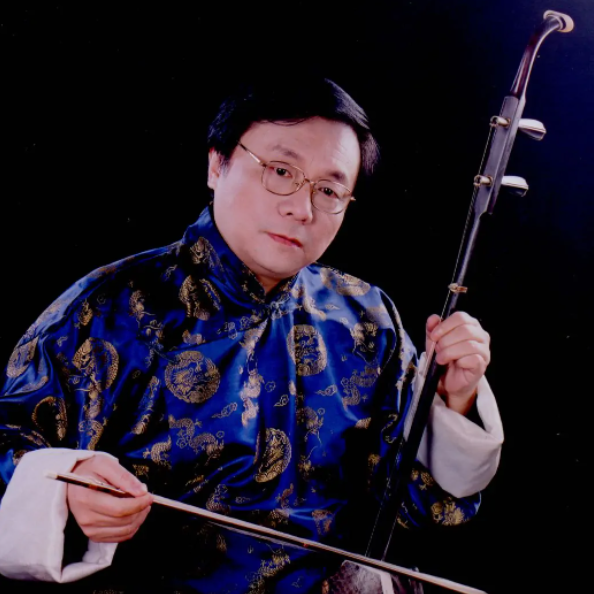Jin Wei

Jin Wei, born in Shanghai in July 1955, is a Chinese erhu player.
In 1972, he was admitted to the Shaanxi Broadcasting Chinese Orchestra. In 1978, he was admitted to Xi'an Conservatory of Music. In 1984, he went to Hong Kong with the Shaanxi Classical Art Troupe to participate in the 9th Asian Art Festival; in the same year, he participated in the "Shancheng Cup" National Folk Music Competition and won the Outstanding Performance Award. In 1992, he held a solo concert at Tsuen Wan Town Hall, Hong Kong. In 1996, he participated in the "Yellow Water Ballad" concert at the Hong Kong Arts Festival; in the same year, he performed in Kyoto, Nara and Kagawa, Japan. In 1997, he participated in the Taipei Arts Festival. In 2002, he participated in the erhu concert in Beijing Guotu Concert Hall. In 2003, he participated in the "Qin Fengqin Yun" national concert in Malaysia.
In 2005, he performed a concert in France with the National Orchestra of Picardy. In 2010, Jin Wei teacher and student concert was held in Xi'an Concert Hall. In 2011, a teacher-student concert of "East and West Achievement" was held in Xi'an Concert Hall. In 2013, participated in the "Qin Feng·Qin Yun" - a special concert of Shaanxi folk instrumental music at the National Grand Theater and Beijing Concert Hall
style features
Jin Wei's huqin music, first of all, has a strong regional cultural color. He summed up, summarized and improved the techniques of the "Qin School Erhu", and formed the techniques of "Hold the String", "Glide", as well as the unique application of "Fingering". "Holding the Strings" is Jin Wei's use of Qin Opera Banhu's playing technique, which improves the problem of "pressing and kneading", which is not round and full. "Portamento" is a common technique used in erhu performance. Jin Wei's performance further subdivides this technique into "downward swing portamento, glissando, up portamento, and tremolo portamento, which enhances the artistic expression of the "Qin School Erhu". It fully displays the high and low-pitched characteristics of Qindi music. Jin Wei's performance absorbs the techniques of "cuddling", "pressing", "sliding" and "wiping" in Qin Opera Banhu, and adds the positioning of the index finger. , one point of upward expansion makes the performance of the Qin style rich and authentic. Secondly, Jin Wei's performance is sincere, simple, and has a local flavor. His performance is not a lingering and beautiful water town style, nor is it a mature and clean academic style. Modern forging is to pursue plain and simple things, to pursue a primitive appearance, and to pursue the consistency of performance and work content.
track range
As one of the representatives of the "Qin School Erhu", Jin Wei's repertoires are mostly works of the Qin School. In his album, the repertoire includes "Qin Feng", "Qin Zhongyin", "Orchid Flower Ballade", "Qujiang Capriccio", Looking to Chang'an", "Qinchuan Xiaoqu", "Qu Jiang Yin", "Loess Love" and other works. Jin Wei's performances of "Qin Feng" and "Loess Love" make people feel the impact of the ravines; listening to "Qinchuan Ballad" or "Mi Hu Tiao" is full of life.
At the same time, Jin Wei's repertoire also includes many traditional erhu pieces such as "Erquan Reflecting the Moon", "Listening to the Pine", "The Newlyweds" and "Moon Night", as well as other Huqin pieces, such as the Cantonese music "Bird Head" played by Gaohu. "Lin" and "Two Voices Hate", "On the Prairie" and "Thinking of Love Outside the Great Wall" played by Zhonghu, "Crescent Moon Five Watches" and "Red and Red Sun in the Border Area" played by Banhu.
In 2015, he participated in the Chinese Music New Year's Concert in Xi'an; in the same year, he cooperated with conductor Hu Bingxu and the Hong Kong City Chinese Orchestra to perform in the concert commemorating the 120th anniversary of Liu Tianhua's birth; in the same year, he participated in the "Chang'an Music School Crossing the Sea" concert in Taipei. show. In 2016, participated in the "Dunhuang Rhyme" Erhu Concert. In 2017, he participated in the erhu special concert held in the Concert Hall of Zhejiang Conservatory of Music. In 2019, he served as the judge of the 12th China Music Golden Bell Award Erhu Competition; in the same year, he participated in the 2019 Beijing China Bowstring Art Festival to perform "Qu Jiang Yin".
Similar artist
Involving musical instruments
Involved portfolio
Involved news
Popular artists
- 01 Cui Jianghui
- 02 bump peng peng peng
- 03 Su Chang
- 04 Moyun
- 05 Li Xianyue cherish
 渝公网安备 50010702504639号
渝公网安备 50010702504639号